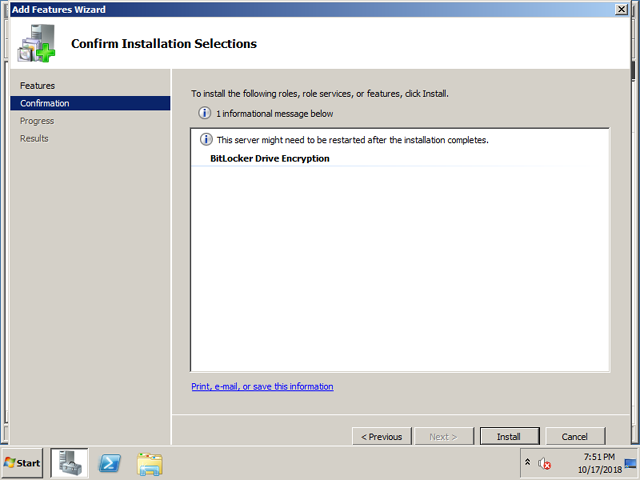
- #BITLOCKER DRIVE ENCRYPTION HOW TO#
- #BITLOCKER DRIVE ENCRYPTION WINDOWS 10#
- #BITLOCKER DRIVE ENCRYPTION PRO#
- #BITLOCKER DRIVE ENCRYPTION PASSWORD#
Go to Start > Run and type: Manage BitLocker If you lose both, you cannot access the content of your drive.
#BITLOCKER DRIVE ENCRYPTION PASSWORD#
Important: Keep the password and recovery key in a safe location. Make sure to create a strong password mixing uppercase, lowercase, numbers, and symbols. When enabling BitLocker, you need to create a password.
#BITLOCKER DRIVE ENCRYPTION HOW TO#
How to Turn on BitLocker on the Operating System Drive

TPM is a unique microchip that enables your device to support advanced security features. By default, you cannot store a recovery key for a removable drive on the same removable drive.īitLocker encryption works best on a computer equipped with a Trusted Platform Module (TPM) chip. You can use BitLocker to mitigate unauthorized data access on lost or stolen computers by encrypting all user files and system files on the operating system drive, including the swap files and hibernation files, and checking the integrity of early boot components and boot configuration data.īitLocker works with a recovery password, and recovery key for an operating system drive or a fixed data drive can be saved to a folder, saved to one or more USB devices, saved to your Microsoft Account, or printed.įor removable data drives, the recovery password, and recovery key can be saved to a folder, saved to your Microsoft Account, or printed. More specific security requirements include encryption and pseudonymization.įor further information, see the article ' Compliance is everybody’s business.' This can be demonstrated by an approved certification mechanism (Article 42).

GDPR requires data controllers and processors to implement “data protection by design and by default,” using appropriate technical and organizational measures (Article 25).

Gfi Products That Can Be Used with BitLockerĪll GFI, Kerio, and Exinda products installed in a Microsoft Operating System are compatible with BitLocker. Consult the cloud solution support if you want to enable BitLocker in the virtual machine itself. Important: When using virtual machines, BitLocker can be enabled on the physical server hosting the virtual machines.
#BITLOCKER DRIVE ENCRYPTION PRO#
For further information see the Windows IP Pro article 'BitLocker.'
#BITLOCKER DRIVE ENCRYPTION WINDOWS 10#
Windows 10 (Education, Pro & Enterprise)īitLocker is a built-in feature of the most recent Microsoft Operating Systems and does not have any additional cost.It also provides more secure data deletion when BitLocker-protected computers are decommissioned as it is much more difficult to recover deleted data from an encrypted drive than from a non-encrypted drive. This article provides the steps needed to enable BitLocker encryption, the compatible GFI products, and a summary of best practices tips.īitLocker is a data protection feature that encrypts the hard drives on your machine to provide enhanced protection against data theft or exposure on computers and removable drives that are lost or stolen.


 0 kommentar(er)
0 kommentar(er)
